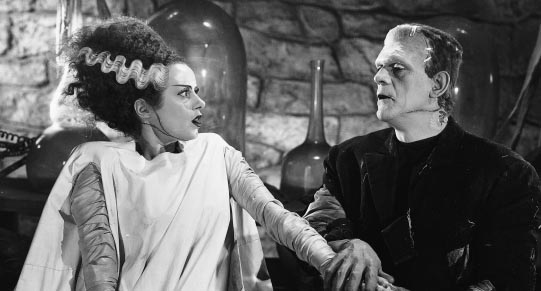NOTHING TO BE AFRAID OF
Our love affair with the paranormal is far, far older than celluloid


It usually goes something like this: average family live peaceful existence in house. Then one day, objects mysteriously relocate. The dog barks at unseen intruders. The tap that usually streams hot water now vomits a liquid the colour of blood. Strange noises are heard in the middle of the night; on the bed, the billowing duvet outlines the shape of a body that no one can see. The youngest child becomes fluent in a previously dead ancient language before scribbling cryptic words such as REDRUM all over the walls (hint: read in front of a mirror). The mother turns hysterical, the husband tries to rationalize the unusual hubbub only to succumb to paranoia followed by the sudden acquisition of otherworldly powers, such as freezing objects with his breath and fingernails that turn into meat cleavers whenever he loses his cool.
Modern paranormal movies have come a long way from the halcyon days of grainy black and white film noir when a good fright involved a poor choice of short cut through the cemetery at midnight. Latterday blockbusters such as Paranormal Activity, The Sixth Sense and X-Men not only leverage the visual baggage we carry in our cultural psyche, they also rely on cutting-edge special effects to bring these myths to life and peel several more micro-layers of skin off our collective hides. Just like zombies, they come crawling into our homes, hell-bent on scaring the living daylights out of the living. And we can’t get enough of it.
Modern society seems obsessed with the paranormal, and yet our comfort level with it is 50-50: we are at the same time curious and repelled by that which we cannot see. This dichotomy is due in part to how we perceive the world around us. Or to be more precise, how we don’t. The human eye is an apparatus whose function is severely restricted. While our visual cortex offers a generous spectrum that is 400-790 Terahertz wide, it is nevertheless a very narrow window through which we can see the Universe; insects, for example, can see well beyond us into the ultraviolet. Still, reality is far wider in scope, with gamma and X-rays, infrared, and microwaves and so on. No wonder we are afraid of the dark, there’s so much more of it around. And it takes up much more space than we sometimes dare imagine.
It’s not just paranormal movies that have progressed over time; our relationship with the unseen has evolved as well. In its modern connotation the adjective ‘paranormal’ denotes events or phenomena that are beyond the scope of normal scientific understanding. However, had you been alive 5000 years ago the paranormal would have been considered very normal. It was a subtle, yet integral part of the whole universal prism: an agreeable lodger co-habiting the same condominium whom you saw by appointment. Even flying Tibetan monks and other extraordinary feats by avatars who transformed water into wine and raised the dead were once considered ordinary achievements by extraordinary people in control of their full co-creative power. Shaman once levitated colossal stones into massive stone circles using nothing more than their guided will-power which, scientifically-speaking, is a series of electro-magnetic impulses.
Somewhere along the line we lost that knowledge and ability, and it’s taken 2000 years and Princeton’s P.E.A.R. laboratory to prove that a correctly-applied frequency does indeed levitate rock. So if ordinary people are capable of such ‘paranormal’ feats then these powers are within reach of anyone who wishes to master them.
All that is needed is an unshakable belief that it can be done. And lots of practise. And there’s the rub: our curiosity in the paranormal exists today because we see in it a seed of truth, that welling within us lies the ability to create whatever we so wish. We are gods in our own fashion, and there are days in our lives when our will manifests in such a way that we believe it. But something happened that made us frightened of wielding this awesome power.
You could say that humans lost confidence in themselves, and in time we began to see the spook in everyday things. From that point on the incredible turned into superstition. Take the much-maligned ‘cemetery’, a word whose Greek origin means ‘a place of sleep’. Sleep equates to rest, hardly cause for alarm. So, how did we become such a frightened species of carbon units? Our recent history provides us with a good excuse.
Continue to part II
Return to Articles